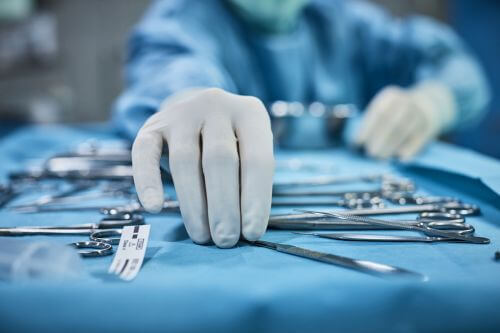It is the surgical removal of hemorrhoids (piles). This is done to resolve defecation problems that often cause pain, bleeding, and discomfort. Hemorrhoid surgery can be performed with open or closed techniques. In the open technique, hemorrhoids are removed directly. In the closed technique, hemorrhoidal vessels are ligated and reduced in size. The postoperative recovery process depends on the patient's general health condition. This procedure aims to improve the quality of life of patients.
In Which Situations Is Hemorrhoid Surgery Performed?
 Advanced hemorrhoids can often cause severe pain and discomfort. If conservative treatment methods (medication, dietary changes, etc.) do not relieve these symptoms, surgery may be considered. It may cause bleeding during defecation. In case of persistent or excessive bleeding, hemorrhoid surgery may be recommended. The growth of hemorrhoids can negatively affect daily life. Large and protruding hemorrhoids may require surgery. If it recurs frequently or becomes chronic, surgical intervention may be required. In case of herniation of external hemorrhoids (protruding during defecation), surgical intervention is recommended. The decision for surgery should be evaluated by the doctor based on the patient's health condition and other factors. Surgical options may vary depending on the type and stage of hemorrhoids.
Advanced hemorrhoids can often cause severe pain and discomfort. If conservative treatment methods (medication, dietary changes, etc.) do not relieve these symptoms, surgery may be considered. It may cause bleeding during defecation. In case of persistent or excessive bleeding, hemorrhoid surgery may be recommended. The growth of hemorrhoids can negatively affect daily life. Large and protruding hemorrhoids may require surgery. If it recurs frequently or becomes chronic, surgical intervention may be required. In case of herniation of external hemorrhoids (protruding during defecation), surgical intervention is recommended. The decision for surgery should be evaluated by the doctor based on the patient's health condition and other factors. Surgical options may vary depending on the type and stage of hemorrhoids.
How is Hemorrhoid Surgery Performed?
 Before hemorrhoid surgery, the patient's general health condition is evaluated. The doctor determines the method of anesthesia (general or local) for the patient. The patient is informed about fasting, medication use and other preparations. Anesthesia is applied for the patient's comfort. This procedure ensures that the patient does not feel pain. Hemorrhoidectomy is the most common method. Hemorrhoid tissue is removed with surgical instruments. It is usually done under general anesthesia. Doppler-guided hemorrhoid artery ligation (THD) is a less invasive method. The vessels that provide blood flow to the hemorrhoids are ligated, thus allowing the hemorrhoids to shrink. With the stapler hemorrhoidopexy method, the remaining tissue in the large intestine is replaced. This method generally results in less pain. Following hemorrhoid surgery The patient is observed and medications are given for pain management. Patients generally stay in the hospital for 1-2 days and are then discharged depending on the patient's general health condition and the procedure. It varies depending on the method. There is a risk of complications after surgery. Therefore, it is important to pay attention to the doctor's instructions. If severe pain, bleeding or signs of infection occur, a doctor should be consulted immediately.
Before hemorrhoid surgery, the patient's general health condition is evaluated. The doctor determines the method of anesthesia (general or local) for the patient. The patient is informed about fasting, medication use and other preparations. Anesthesia is applied for the patient's comfort. This procedure ensures that the patient does not feel pain. Hemorrhoidectomy is the most common method. Hemorrhoid tissue is removed with surgical instruments. It is usually done under general anesthesia. Doppler-guided hemorrhoid artery ligation (THD) is a less invasive method. The vessels that provide blood flow to the hemorrhoids are ligated, thus allowing the hemorrhoids to shrink. With the stapler hemorrhoidopexy method, the remaining tissue in the large intestine is replaced. This method generally results in less pain. Following hemorrhoid surgery The patient is observed and medications are given for pain management. Patients generally stay in the hospital for 1-2 days and are then discharged depending on the patient's general health condition and the procedure. It varies depending on the method. There is a risk of complications after surgery. Therefore, it is important to pay attention to the doctor's instructions. If severe pain, bleeding or signs of infection occur, a doctor should be consulted immediately.
Things to Consider After Hemorrhoid Surgery
 Rest if possible in the first days after hemorrhoid surgery. Limiting physical activities promotes healing. Use painkillers recommended by the doctor regularly. Pain control helps you do your daily activities more comfortably. Follow a fiber-rich diet. Fruits, vegetables and whole grains reduce the risk of constipation and help keep stools soft. Don't forget to drink plenty of water. Adequate fluid intake supports the regular functioning of the digestive system. Avoid heavy lifting and intense physical activity for the first few days. Light activities, such as walking, increase blood circulation. Do not postpone your toilet needs. Develop regular toilet habits to avoid difficulty during defecation. You can use natural products that soften the stool or medications recommended by your doctor. Keep the hemorrhoid surgery area clean and dry. Follow the hygiene rules recommended by the doctor. Taking a warm bath with hot water can reduce pain and promote healing. Do not skip check-up appointments after surgery. Your doctor will need these appointments to monitor your recovery progress. Consult your doctor in cases such as excessive bleeding, fever, and severe pain after surgery. Take the medications recommended by the doctor regularly and pay attention to the instructions for use. Following these recommendations will make your post-hemorrhoid surgery process easier and protect your health. If you have any concerns after the operation, be sure to consult your doctor.
Rest if possible in the first days after hemorrhoid surgery. Limiting physical activities promotes healing. Use painkillers recommended by the doctor regularly. Pain control helps you do your daily activities more comfortably. Follow a fiber-rich diet. Fruits, vegetables and whole grains reduce the risk of constipation and help keep stools soft. Don't forget to drink plenty of water. Adequate fluid intake supports the regular functioning of the digestive system. Avoid heavy lifting and intense physical activity for the first few days. Light activities, such as walking, increase blood circulation. Do not postpone your toilet needs. Develop regular toilet habits to avoid difficulty during defecation. You can use natural products that soften the stool or medications recommended by your doctor. Keep the hemorrhoid surgery area clean and dry. Follow the hygiene rules recommended by the doctor. Taking a warm bath with hot water can reduce pain and promote healing. Do not skip check-up appointments after surgery. Your doctor will need these appointments to monitor your recovery progress. Consult your doctor in cases such as excessive bleeding, fever, and severe pain after surgery. Take the medications recommended by the doctor regularly and pay attention to the instructions for use. Following these recommendations will make your post-hemorrhoid surgery process easier and protect your health. If you have any concerns after the operation, be sure to consult your doctor.


